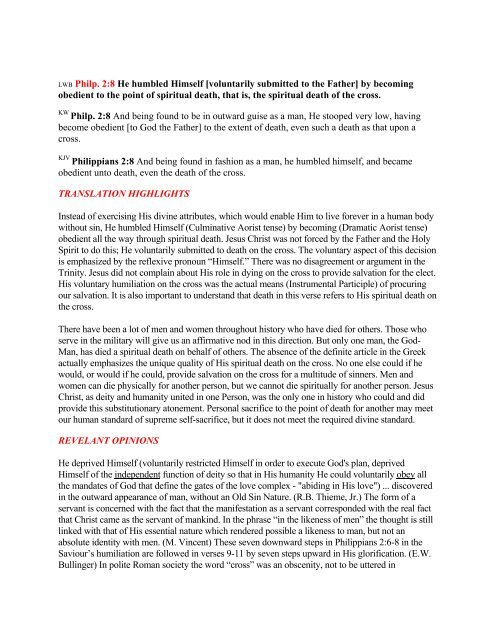Philippians - Verse-by-Verse Biblical Exegesis
Philippians - Verse-by-Verse Biblical Exegesis
Philippians - Verse-by-Verse Biblical Exegesis
You also want an ePaper? Increase the reach of your titles
YUMPU automatically turns print PDFs into web optimized ePapers that Google loves.
LWB Philp. 2:8 He humbled Himself [voluntarily submitted to the Father] <strong>by</strong> becoming<br />
obedient to the point of spiritual death, that is, the spiritual death of the cross.<br />
KW Philp. 2:8 And being found to be in outward guise as a man, He stooped very low, having<br />
become obedient [to God the Father] to the extent of death, even such a death as that upon a<br />
cross.<br />
KJV <strong>Philippians</strong> 2:8 And being found in fashion as a man, he humbled himself, and became<br />
obedient unto death, even the death of the cross.<br />
TRANSLATION HIGHLIGHTS<br />
Instead of exercising His divine attributes, which would enable Him to live forever in a human body<br />
without sin, He humbled Himself (Culminative Aorist tense) <strong>by</strong> becoming (Dramatic Aorist tense)<br />
obedient all the way through spiritual death. Jesus Christ was not forced <strong>by</strong> the Father and the Holy<br />
Spirit to do this; He voluntarily submitted to death on the cross. The voluntary aspect of this decision<br />
is emphasized <strong>by</strong> the reflexive pronoun “Himself.” There was no disagreement or argument in the<br />
Trinity. Jesus did not complain about His role in dying on the cross to provide salvation for the elect.<br />
His voluntary humiliation on the cross was the actual means (Instrumental Participle) of procuring<br />
our salvation. It is also important to understand that death in this verse refers to His spiritual death on<br />
the cross.<br />
There have been a lot of men and women throughout history who have died for others. Those who<br />
serve in the military will give us an affirmative nod in this direction. But only one man, the God-<br />
Man, has died a spiritual death on behalf of others. The absence of the definite article in the Greek<br />
actually emphasizes the unique quality of His spiritual death on the cross. No one else could if he<br />
would, or would if he could, provide salvation on the cross for a multitude of sinners. Men and<br />
women can die physically for another person, but we cannot die spiritually for another person. Jesus<br />
Christ, as deity and humanity united in one Person, was the only one in history who could and did<br />
provide this substitutionary atonement. Personal sacrifice to the point of death for another may meet<br />
our human standard of supreme self-sacrifice, but it does not meet the required divine standard.<br />
REVELANT OPINIONS<br />
He deprived Himself (voluntarily restricted Himself in order to execute God's plan, deprived<br />
Himself of the independent function of deity so that in His humanity He could voluntarily obey all<br />
the mandates of God that define the gates of the love complex - "abiding in His love") ... discovered<br />
in the outward appearance of man, without an Old Sin Nature. (R.B. Thieme, Jr.) The form of a<br />
servant is concerned with the fact that the manifestation as a servant corresponded with the real fact<br />
that Christ came as the servant of mankind. In the phrase “in the likeness of men” the thought is still<br />
linked with that of His essential nature which rendered possible a likeness to man, but not an<br />
absolute identity with men. (M. Vincent) These seven downward steps in <strong>Philippians</strong> 2:6-8 in the<br />
Saviour’s humiliation are followed in verses 9-11 <strong>by</strong> seven steps upward in His glorification. (E.W.<br />
Bullinger) In polite Roman society the word “cross” was an obscenity, not to be uttered in









